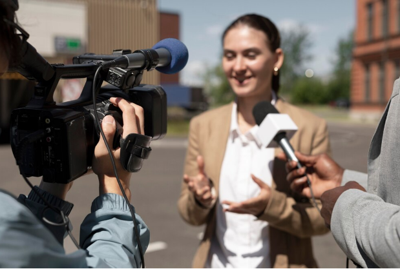
Community journalism doesn’t just report the news. It brings local voices to the surface and strengthens connections between people. For students, it offers something even more powerful — a chance to learn by doing. In an age where fast, flashy media often overshadows truth, community journalism gives students the tools to understand the world around them, tell real stories, and grow as thinkers and citizens.
Hands-On Learning That Sticks
Books and lectures matter, but nothing teaches like experience. Student journalists who report on local stories — school board meetings, neighborhood issues, or town events — learn how communities function. They ask tough questions, sort through facts, and write clearly for an audience that might include their teachers, neighbors, or even local officials. While working on tight deadlines and chasing stories, students improve their research, writing, and communication skills. These are things no test can fully measure, but they matter in every career. Sometimes students need help managing this workload, especially when balancing with other assignments. In this case, Edubirdie can be useful. This reliable writing service has been helping students for many years. It connects students with professional writers who can assist with essays, editing, and research projects. The platform is easy to use and offers real-time support, making it a reliable backup when deadlines pile up. Many users appreciate how it helps reduce stress without sacrificing quality.
Building Confidence Through Local Impact
When students see their work published — even in a small community outlet — it shifts their perspective. They write for real people, not just for teachers. Readers notice. Neighbors share their thoughts. Local leaders sometimes respond or take action. This changes everything. Students feel heard and valued. Their work creates real impact.
They begin to:
- Ask better questions
- Write with purpose
- Care about accuracy
- Take feedback seriously
- Trust their voice
With each story, their confidence grows. Journalism becomes more than homework — it becomes a way to create change.
Strengthening Civic Engagement
Community journalism shows students how democracy works in real life. Attending local council meetings helps them see who holds power. They watch decisions unfold. They see how public voices shape outcomes. Local laws start to feel real — they affect schools, parks, and safety. A 2024 study found that 68% of student journalists felt more engaged in civic issues after reporting on them. Many asked better questions and spoke up in class. Some contacted local officials. This shift turns passive students into active citizens. Some even run for office or lead community programs later.
Developing Empathy Through Storytelling
Reporting on community issues puts students face-to-face with real lives. They meet parents pushing for school reform. They speak with shop owners facing rising costs. They hear from immigrants learning a new system. These voices expand their view of the world. Listening to different stories builds empathy. Students stop making quick judgments. They write with care and honesty. Respect becomes part of their process. Their writing improves. More importantly, they mature. They begin to understand others in a deeper, more human way.
Adapting to a Changing Media Landscape
Today’s students live online. They scroll through headlines, share posts, and watch news on their phones. But creating content is different from consuming it. Community journalism gives students the chance to learn how news is made, how facts are verified, and how to communicate clearly across platforms. They also learn to spot misinformation. By checking sources, interviewing firsthand, and seeing how easily facts can be twisted, students become more media literate. These are crucial skills in a time when truth often feels hard to find.
Opening Doors to Future Careers
Not every student journalist becomes a reporter. Still, the skills they gain matter in many fields. Employers look for people who can think fast and write clearly. Community journalism builds that.
Students learn to:
- Work under pressure
- Meet tight deadlines
- Solve problems quickly
- Speak with confidence
- Adapt to feedback
Many journalism schools now require community reporting. It gives students real-world experience early, which helps them stand out in jobs across business, law, education, and more.
Conclusion
Community journalism pushes students into the real world. They face deadlines, make choices, and see results. It’s bold, fast, and honest. They sharpen their minds, grow more persistent, and learn to care. In that rush, they write better, think deeper, and truly evolve.


(0) comments
Welcome to the discussion.
Log In
Keep the discussion civilized. Absolutely NO personal attacks or insults directed toward writers, nor others who make comments.
Keep it clean. Please avoid obscene, vulgar, lewd, racist or sexually-oriented language.
Don't threaten. Threats of harming another person will not be tolerated.
Be truthful. Don't knowingly lie about anyone or anything.
Be proactive. Use the 'Report' link on each comment to let us know of abusive posts.
PLEASE TURN OFF YOUR CAPS LOCK.
Anyone violating these rules will be issued a warning. After the warning, comment privileges can be revoked.